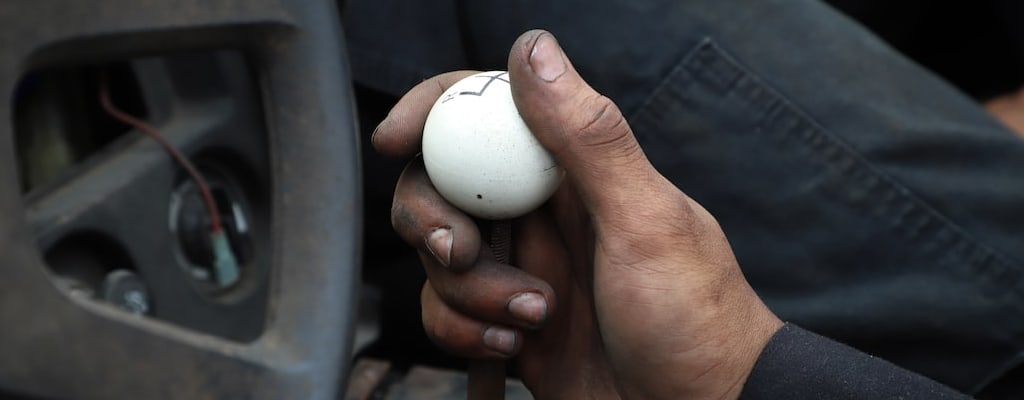kick the tires: Idiom Meaning and Origin
What does ‘kick the tires’ mean?
The idiom kick the tires means to examine or inspect something thoroughly before making a decision or commitment. It is often used when talking about evaluating or testing the quality or condition of a product, idea, or opportunity.

Idiom Explorer
The idiom "test the waters" means to try something cautiously or to gather information before making a decision or taking action.
The idiom "kick the habit" means to stop or break a bad or addictive behavior or addiction. It can refer to giving up smoking, drugs, or any other negative habit.
The idiom "kick the can down the road" means to delay or postpone addressing a problem or making a decision, often because it is difficult or unpopular to do so at the present time.
The idiom "kick some tires" means to inspect or evaluate something, typically a product or a potential deal, before making a decision. It implies a thorough examination or assessment to ensure reliability or quality.
The idiom "kick one's heels" means to wait idly or impatiently for something or someone without any purpose or result.
The idiom "kick off" means to start or begin something, often forcefully or enthusiastically. It can also refer to the moment a game or event begins.
The idiom "kick loose" means to break free or detach from a situation or person. It implies a desire for independence and liberation.
The idiom "kick it" means to relax, have fun, or spend time casually with friends or acquaintances. It often implies a laid-back and informal atmosphere, where one can enjoy themselves without any specific agenda or responsibilities.
The idiom "kick into touch" means to deliberately avoid dealing with something or to delay a decision or action. It is often used in contexts where someone is trying to avoid taking responsibility or facing a difficult or unpleasant situation.
Unexpected Origins
Kick the tires is an idiomatic phrase used in American English. It is primarily used in informal contexts and has its origins in the automotive industry. The phrase specifically refers to evaluating something to check its quality or condition.
The phrase "kick the tires" is a metaphorical expression that symbolizes a thorough and hands-on inspection of a product or situation. It suggests a level of skepticism or caution in assessing the reliability of something.
As with many idioms, "kick the tires" has evolved to include variations and related phrases. Some examples of these include "kick the tyres," used primarily in British English, and "kick the tires and light the fires," which emphasizes both evaluation and subsequent action or enthusiasm.
While the idiom's original usage related specifically to the inspection of cars, it has since become more widely applied to a range of scenarios beyond the automotive realm. It can be used to describe the act of appraising a variety of objects, such as electronics, appliances, or furniture. Additionally, it can be employed in discussions about evaluating ideas, projects, or even potential romantic partners.
The related idiom "kick some tires" is a variation of "kick the tires." It conveys the same meaning of examining or evaluating something, but with a slightly different phrasing. It can be used interchangeably with "kick the tires" in most contexts.
A similar idiom related to "kick the tires" is "test the waters." This phrase also signifies the act of evaluating or exploring something, often in a preliminary or cautious way. It is commonly used in situations where one wants to assess potential risks or opportunities before fully committing or making a decision.
Another related idiom is "give something a whirl." This expression conveys the idea of trying something out or giving it a chance. It implies a willingness to experiment or experience something new, similar to the concept of "kick the tires" where one evaluates and assesses the worth or reliability of something.
The final related idiom is "kick it." This phrase has a more informal and colloquial connotation, often used in casual conversations or among friends. "Kick it" typically means to relax or hang out, but it can also refer to taking a break or pausing a particular activity. While it may not directly relate to the evaluation or assessment aspect of "kick the tires," it is still a commonly used idiom in American English.
Overall, "kick the tires" serves as a concise and evocative expression for the act of assessing or evaluating something. It encapsulates the notion of a careful and hands-on examination, suggesting a desire to ensure quality or reliability. As with many idioms, the phrase demonstrates the creativity and conciseness of language as it continually evolves to adapt to changing contexts and needs. The variations and related idioms, such as "kick some tires," "test the waters," "give something a whirl," and "kick it," further illustrate the versatility and widespread usage of this idiom in both informal and formal situations.
Example usage
Examples of how the idiom "kick the tires" can be used in a sentence:
- He wanted to make sure the used car was in good condition, so he decided to kick the tires before making a purchase.
- Before investing in the business, the potential investor wanted to kick the tires and thoroughly evaluate its financial stability.
- The team leader wanted to kick the tires on the new project proposal to ensure it was well thought out and had a solid plan for success.
More "Automotive" idioms



